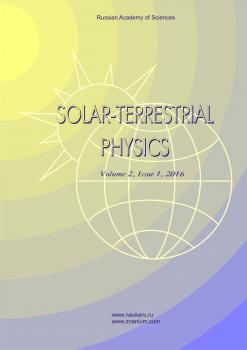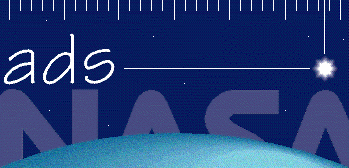Иркутск, Россия
Иркутск, Россия
We have examined the dynamics of the longitudinal magnetic field of active region NOAA 12673, using data from the Solar Dynamics Observatory (SDO). During the passage of the active region (AR) across the solar disk, its spots and background fields showed complex motion trajectories, and numerous small-scale short-lived local polarity inversion lines (LPILs) were formed when new magnetic fluxes appeared in the AR and came closer to fields of opposite polarity. The length of LPILs was less than 15.000 km (~20 arcsec); their lifetime was several hours. Study of the flare activity of NOAA 12673 has shown that low-power flares (optical class S, area ˂2 sq. degrees) generally occur near LPILs. Before small flares and the September 06, 2017 large flare (optical importance 3B, X-ray class X9.3), in limited sites of local and main polarity inversion lines there were shear stresses and an increase in the magnetic field gradient: in the region of low-power flares, to 1.3–1.5 G/km; in the region of the large flare, 3–3.5 G/km. The results obtained suggest that the longitudinal magnetic field behaves similarly before both small and large flares.
flares, magnetic fields, polarity inversion lines
1. Altyntsev A.T., Banin V.G., Kuklin G.V., Tomozov V.M. Solar Flares. Moscow, Nauka Publ., 1982, 246 p.
2. Borovik A.V. Centers of flare activity of sunspot groups. Research on geomagnetism, aeronomy and solar physics. 1994, Vol. 102, pp. 133-152.
3. Borovik A.V. Low-power solar flares in the H𝛼 line: research results. Izvestiya Krymskoi Astrofizichesko. Observatorii. 2023, vol. 119, no. 1, pp. 27-41.
4. Borovik A.V., Zhdanov A.A. Distribution of low-power solar flares by brightness rise time. Solar-Terr. Phys. 2018, vol. 4, no. 3, pp. 3-12. DOI:https://doi.org/10.12737/stp-43201801.
5. Borovik A.V., Zhdanov A.A. Low-power solar flares of optical and X-ray wavelengths for solar cycles 21-24. Solar-Terr. Phys. 2020, vol. 6, no. 3, pp. 16-22. DOI:https://doi.org/10.12737/stp-63202002.
6. Borovik A.V., Mordvinov A.V., Golubeva E.M., Zhdanov A.A. Restructuring of the solar magnetic fields and flare activity centers in cycle 24. Astronomy Rep. 2020, vol. 64, no. 6, pp. 540-546. DOI:https://doi.org/10.31857/S0004629920070014.
7. Cao T., Hu F., Xie G. Morphological properties of major spotless two-ribbon flare on 23 April 1981. Scientia Sinica, Ser. A. Mathematical, Physical, Astronomical and Technical Sci. 1983, vol. 26, pp. 972-977.
8. Hagyard M.J., Moore R.L., Emslie A.G. The role of magnetic field shear in solar flares. Adv. Space Res. 1984, vol. 4, no. 7, pp. 71-80. DOI:https://doi.org/10.1016/0273-1177(84)90162-5.
9. Heyvaerts J., Priest E.R., Rust D.M. An emerging flux model for the solar flare phenomenon. Astrophys. J. 1977, vol. 53, no. 1, pp. 255-258. DOI:https://doi.org/10.1086/155453.
10. Hoyng P., Duijveman A., Machado M.E., et al. Origin and location of the hard X-ray emission in a two-ribbon flare. Astrophys. J. 1981, vol. 246, no. 2,pp. LI55-LI59. DOI:https://doi.org/10.1086/183574.
11. Krivsky L. Interaction of magnetic fields and the origin of proton flare. Proc. IAU Symposium. Structure and Development of Solar Active Regions. 1968, no. 35, pp. 465-470.
12. McKenzie D.E. Signatures of reconnection in eruptive flares. Yohkoh 10th anniversary meeting, COSPAR Colloquia Ser. 2002, vol. 13, pp. 155-164. DOI:https://doi.org/10.1016/S0964-2749(02)80041-5.
13. Parker E.N. Nanoflares and the solar X-ray corona. Astrophys. J. 1988, vol. 330, pp. 474-479. DOI:https://doi.org/10.1086/166485.
14. Piddington J.H. Solar magnetic fields and convection. I. Active regions and sunspots. Astrophys. Space Sci. 1975, vol. 34, no. 2, pp. 347-362. DOI:https://doi.org/10.1007/BF00644803.
15. Priest E. Solar Magnetohydrodynamics. Moscow, Mir Publ., 1985, 592 p. (In Russian).
16. Romano P., Elmhamdi A., Kordi A.S. Two strong white-light solar flares in AR NOAA 12673 as potential clues for stellar superflares. Solar Phys. 2019, vol. 294, no. 4, pp. 4-8. DOI:https://doi.org/10.48550/arXiv.1812.04581.
17. Sundara R.Κ. Selvendran R., Thiagarajan R. On the triggering of quiet region flares without filament activation. Bull. Astr. Soc. India. 1997, vol. 25, pp. 533-540.
18. Svestka Z. Solar flares. Dordrecht: Reidel. 1976, 399 p.
19. Verma M. The origin of two X-class flares in active region NOAA 12673. Shear flows and head-on collision of new and preexisting flux. Astron. Astrophys. 2018, vol. 612, article number A101, p. 7. DOI:https://doi.org/10.1051/0004-6361/201732214.
20. Yang S., Zhang J., Zhu X., Song Q. Block-induced complex structures building the flare-productive solar active region 12673. Astrophys. J. Lett. 2017, vol. 849, L21, pp. 1-7. DOI:https://doi.org/10.3847/2041-8213/aa9476.
21. URL: http://jsoc.stanford.edu (accessed November 19, 2023).
22. URL: https://gong.nso.edu (accessed November 19, 2023).


















